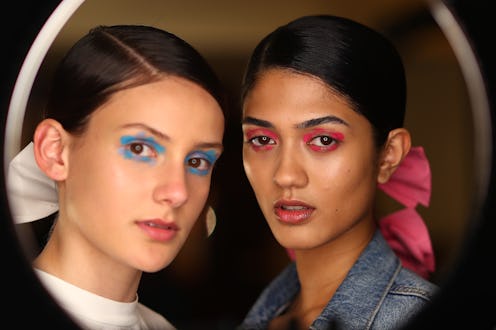(Beauty)
Here's How To Master The Monochromatic Eyeshadow Trend In One Weekend

Single-color eyeshadow was the little trend that could. It bubbled up into the beauty community's consciousness slowly, look after look, until one day you could scroll through pictures from a red carpet and see more of the monochromatic eyeshadow trend than smoky eyes or cut creases. "Monochromatic makeup looks have been a big trend in the last few years," notes makeup artist Dan Delgado. "We are in a time where women like to be more playful with their makeup, but at the same time, not spending hours to achieve it."
Nonetheless, learning how to "achieve" any eyeshadow look — monochrome included — takes patience. "Creating a monochromatic eyeshadow look can be as simple as a single wash of color or an elaborate layered variation of the same shade; the level of difficulty all depends on how dramatic you want your look to be," says Ulta Beauty Pro Team Member and makeup artist, Deney Adam, over email.
In other words: Makeup beginners and pros alike can pull it off, and having fun doing it. "If you’re short on time yet want to stay on trend, a wash of color all over the eyelid will do the trick," suggests Adam. "I love the Ulta Beauty Collection Matte Cream Eyeshadow. The creamy texture glides on smooth for a quick and beautiful pop of color."
As you could guess, eyeshadow brushes can come in handy here. Adam recommends three, "as they all have a slightly different effect and will help give you control over how bold you want your look to be," he says: The Morphe x Jeffree Star JS11 Blunt Packer Brush "when applying cream-base products," the Morphe Pro Firming Blending Fluff "for blending and smoothing out excess shadow," and a "tightly compact small fluffy brush" or Flat Precision Brush for detail work. (Adding in matching eyeliner? Adam recommends an angled brush.)
Feel free to use any tools you have on hand, though. "I still love to use my fingers to achieve highly pigmented eyeshadow looks," says Delgado. His monochromatic eyeshadow technique is simple, too: "I would normally use first a cream eyeshadow all over the eyelid with a flat eyeshadow brush, then use a small blending brush with either loose pigment or an eyeshadow of the same color to set an enhance the cream color," Delgado explains. "To finish off, I would use the same blending brush to blend the edges with what is left of the product on the brush."
Now, onto the fun part — the eyeshadow. Below, the brands (and products) both makeup artists recommend.
We only include products that have been independently selected by The Zoe Report's editorial team. However, we may receive a portion of sales if you purchase a product through a link in this article.